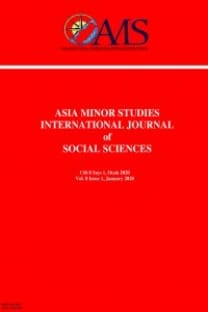Özbek Ceditçi Hamza Hakimzoda Niyoziy’nin Tiyatro Faaliyetleri ve Zaharli Hayot Yohud Ishk Qurbonları (Zehirli Hayat Yahut Aşk Kurbanları) Piyesi
Cedit tiyatrosunun amacı, siyasi ve sosyal hadiselerin yansıtılması, eğitimli ve aydın olma düşüncelerinin, hürriyet bilincinin halka kolay ulaştırılması olmuştur. Halktan büyük ilgi ve takdir gören Cedit tiyatrosu, eğitimde yenileşmeyi temel almış, karşılaşılan tüm olumsuzlukların aslında eğitimsizlikten ve cahillikten kaynaklandığını vurgulamıştır. İşgal ve sömürgeden kurtulmanın çaresi olarak yenileşmenin şart olduğunu savunan Ceditçiler, genç nesillerin modern yöntemlerle eğitilmelerinde ısrarcı olmuşlardır. 20.yy’ın ilk yıllarında Özbek milli tiyatrosunun meydana gelmesinde ve aydınlanma hareketinin oluşmasında en büyük pay Ceditçi aydınlarındır. Çağdaş medeniyet seviyesine yükselmenin halkı bilinçlendirmeyle olacağını ve bunun için en kestirme ve etkili yolun tiyatro olduğunu düşünen Ceditçilerin en önemli temsilcilerinden biri de Hamza Hakimzoda Niyoziy’dir. Özbek edebiyatına büyük katkıları olan Hamza, iyi bir eğitimci, iyi bir şair ve önemli bir tiyatro yazarıdır. 40’tan fazla sahne eseri bulunan Hamza’nın hayatı ve eserleri pek çok çalışmaya konu olmuş, Özbekistan Devlet Sanatçısı unvanıyla ödüllendirilmiştir. Pek çok yere adı verilmiş olan Hamza Hakimzoda’nin çalışmamıza konu olan Zaharli Hayot Yohud Ishk Qurbonlari isimli piyesi insan hayatına kast edecek seviyelerdeki geri kalmışlığın doğurduğu sonuçları, eğitilmemiş ailelerin sebebiyet vereceği çarpık durumları işlemiştir. Özellikle gençlerin eğitilmesine önem veren Hamza Hakimzoda, Özbeklerin bu bağlamda manevi destekçisi olmuştur. Çalışmamızda yazarın biyografisinin yanı sıra Zaharli Hayot Yohud Ishk Qurbonlari (Zehirli Hayat Yahut Aşk Kurbanları) piyesine yer verilecektir.
Uzbek Jadıdıst Hamza Hakımzoda Nıyozıy’s Theatre Actıvıtıes and Play of Zaharli Hayot Yohud Ishk Qurbonları (Zehirli Hayat Yahut Aşk Kurbanları)
The aim of the Jadid theater was to reflect political and social events, to educate and enlightened thoughts and to bring freedom of consciousness to the public easily. The Jadid theater, which has received great interest and appreciation from the public, is based on innovation in education and emphasizes that all the problems encountered are in fact caused by lack of education and ignorance. Jadidists, defending the necessity of modernization as a cure for invasion and colonial liberation, insisted on educating the younger generations with modern methods. In the first years of the 20th century, the Jadidist intellectuals had the biggest share in the formation of the Uzbek national theater and the formation of the enlightenment movement. Hamza Hakimzoda Niyoziy is one of the most important representatives of the Ceditists who think that the rise to the level of contemporary civilization will be through public awareness and the most direct and effective way to do so is theater. He is a great educator, a good poet and an important theater writer. With more than 40 scenes, Hamza's life and works have been the subject of many works and he was awarded the title of State Artist of Uzbekistan. Hamza Hakimzoda, who has been named in many places, is the subject of our study, Zaharli Hayot Yohud Ishk Qurbonlari, has processed the consequences of backwardness at levels that would mean human life, and the distorted situations that would be caused by uneducated families. Hamza Hakimzoda, who attaches importance to the education of young people, has been the spiritual supporter of the Uzbeks in this context. In addition to the biography of the author, Zaharli Hayot Yahud Ishk Qurbanlari (Poisoned Life Or Love Victims) will be included in our study.
Keywords:
Theatre, Jadidists, Hamza Hakimzoda play,
___
- Baydemir, H. (2011). Özbekistan’da geleneksel tiyatronun bir şubesi: Maskarabazlık ve Kızıkçılık. Turkish Studies, Volume 6/1, winter 2011, 763-777.
- Karakaş, Ş. (2001). Türkistan’da ilk tiyatro faaliyetleri ve Pederkuş piyesi. Kırgızistan-Türkiye Manas Üniversitesi sosyal Bilimler Dergisi, 2, 162-185.
- Mirzayev, S.; Shermuhammedov, S. (1993). Hozirgi Zamon O’zbek adabiyeti tarixi. Taşkent: O’zbekiston.
- Mirzayev, S. (2005). XX. Asr O’zbek adabiyoti, Taşkent: Yangi Asr Avlodi.
- Rizayev, Sh. (1997). Jadid draması. Taşkent: Shark Nashriyet-Matbaa Koncherniyasining Bosh Tahririyati.
- Tursunboyev, S. (2005). Teatr tarixi. Taşkent: Bilim.
- Vurgun Yılmaz, S. (2014). Türkistan’da Ceditçilik hareketinin etkisinde tiyatro. Trakya Üniversitesi Sosyal Bilimler dergisi, Aralık, c.16, s.2, 219-232.
- ISSN: 2147-1673
- Yayın Aralığı: Yılda 2 Sayı
- Başlangıç: 2013
- Yayıncı: Serhat KUZUCU
